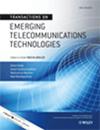Persistent resource allocations for VoIP traffic in packet-switching mobile cellular networks
引用次数: 1
Abstract
It is expected that future IMT-Advanced systems will operate packet-switched due to the dominance of data services. However, it is inherent to packet-switched systems to not cope well with voice services as periodic resource usage patterns are not signalled efficiently. In this paper, we present a simple technique to reduce the signalling overhead for resource allocations especially for voice-over-IP (VoIP) traffic thus increasing the VoIP capacity of the system, considerably. The proposed technique assigns persistent resource allocation (PRA) per VoIP connection that are valid for a fix number of frames. Resource allocations for succeeding frames have to be signalled by new PRAs. This supersedes any procedures for deallocation of PRAs and associated error handling. Within our work we introduce an analytical model to evaluate the possible VoIP capacity gains. Additionally, we show results of event-driven simulations to validate the analysis. The PRA technique is applicable to all packet-switched systems. We show exemplary results for the WiMAX system. In this paper, we present a simple technique called persistent resource allocation (PRA) to reduce the signalling overhead in packet-switching mobile radio networks, especially for VoIP traffic. The figure shows our idea: resource allocations for mobile station (MS) 42 are signalled in frame n (solid lines) and remain valid in frame up to frame (dashed lines). The parameter k matches the period length of packet arrival in number of frames and m limits the life time (time-to-live) of the PRA. Copyright © 2010 John Wiley & Sons, Ltd.分组交换移动蜂窝网络中VoIP业务的持久资源分配
由于数据业务的主导地位,预计未来的IMT-Advanced系统将运行分组交换。然而,由于周期性资源使用模式不能有效地发出信号,分组交换系统固有的问题是不能很好地处理语音业务。在本文中,我们提出了一种简单的技术来减少资源分配的信令开销,特别是对于ip语音(VoIP)流量,从而大大增加了系统的VoIP容量。提出的技术为每个VoIP连接分配持久资源分配(PRA),这些连接对固定数量的帧有效。后续帧的资源分配必须由新的pra发出信号。这取代了任何用于重新分配PRAs和相关错误处理的过程。在我们的工作中,我们引入了一个分析模型来评估可能的VoIP容量增益。此外,我们展示了事件驱动模拟的结果来验证分析。PRA技术适用于所有的分组交换系统。我们展示了WiMAX系统的示例结果。在本文中,我们提出了一种简单的技术,称为持久资源分配(PRA),以减少分组交换移动无线网络中的信令开销,特别是对于VoIP流量。该图显示了我们的想法:移动站(MS) 42的资源分配在帧n(实线)中发出信号,并在帧之间保持有效(虚线)。k以帧数匹配报文到达的周期长度,m限制PRA的生存时间。版权所有©2010 John Wiley & Sons, Ltd
本文章由计算机程序翻译,如有差异,请以英文原文为准。
求助全文
约1分钟内获得全文
求助全文

 求助内容:
求助内容: 应助结果提醒方式:
应助结果提醒方式:


